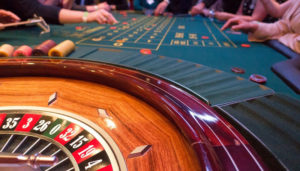Las Vegas Gambling Tips – Mental Muscle In Poker
Las Vegas Gambling Tips: Mental Muscle In Gambling
On The Town With Vegas Vic
By: Victor H. Royer
Welcome to Las Vegas! My name is Victor H. Royer, but everyone just calls me Vegas Vic. I was named after that famous neon sign in Downtown Las Vegas, that cowboy with the hat on top of the Pioneer Club, always waving his hand and beckoning to his long love, Sassy Sally, on the other side of the street. I will be writing a few articles for AccessVegas.com, so I hope you enjoy them.
Mental Muscle In Gambling
One formerly professional poker player (now retired) recently mucked a pair of aces against a bluff. We all muck our cards from time to time. Particularly when we either don’t have a decent starting hand, but more so if we think that someone else has a better hand. It’s a mind game. Basically, it is a mental condition which causes us to “muck” our mental confidence. This condition is either a reflex reaction, or one brought about by the appearance of strength from an opponent. In some cases, psychologists can call this a reflex-reaction. In poker, these reflex-reactions can actually be instigated by methods of play.
Poker is a game of cards, but in reality it is a game of mind. Perhaps not so much in lower limits, but certainly so in higher limit games, and even more profoundly in professional high-stakes games and tournaments. Many notable professionals and highly successful tournament players, such as the late Stu Unger, have been known to “put the man off his hand”. This was so during the Last World Series that Unger won, when he was seen putting his opponent off his hand with a starting hand of jack-nine off-suit. He flopped jack-nine, but that was beside the point. This is often referred to as the “intimidation factor”, but it is perhaps more accurately described as psychological warfare.
As a result, poker is perhaps the only casino game in which winning, or losing, depends more on the mental condition of the players, rather than the card-events themselves. At a recent poker game, one of the players at my table made another player fold aces-full. Was this because he had the fourth ace? Or something else? It was a classic example of a “mind over cards”.
The player with the aces-full was placed in a mental condition in which he became convinced that his aces-full were the worst hand. This was not so, but it didn’t matter. He folded and the other player took the pot. Therefore, it was not the card-event itself that was the deciding factor in winning this pot. Instead, it was the mind factor. This is quite unique, and these situations, in gaming, are almost never encountered in any other casino game (in other card games perhaps, but not among those traditionally offered in casinos, other than poker-style games).
We all speak about “confidence” when playing poker. We also speak about the “appearance” of strength, which is part of the confidence-factor. But all these situations are far more akin to exercises in mental manipulation than they are exercises in confidence or mental strength. Mind manipulation has long been the tool-of-the-trade for any self-respecting ad man, or a spy.
Advertising convinces us to buy something not so much because of what the product is, but because of what we think the product is, as based on the manipulation of our mental disposition after being exposed to the advertisement. Deception, as practiced in intelligence-gathering, is also a method of mental manipulation. And, likewise, all these situations apply equally profoundly to poker. Although we may know that the odds of such and such a card coming on the river may be long, this in itself is not necessarily the decision-breaking, or making, consideration.
What is more important is to make the opponent think that these odds aren’t as long as they indeed are, or, perhaps, to make the opponent think that he is, in fact, wrong about everything to do with this hand. This can be accomplished by many means, and certainly not by being arrogant at the table. In fact, arrogance, excessive talking, tossing of cards, abuse of dealer and all these other nasty things that some players do, are usually an indication of a weak mind, and a weak hand. I had a recent example of this with a player whose table conduct is usually described in four-letter words. He was exactly the kind of player which we don’t want in poker.
But his conduct was indicative of his mental condition. As a direct result, many players were able to “put him off his hand” by betting into his weakness. Of course, this requires establishment, as indeed all mental manipulations do. There has to be a circumstance of demonstration which then contributes to the following sequence of events. Cumulatively, these then begin to have the desired effect, and the player will fold many more hands more often than he would otherwise.
All of these situations have less to do with the cards themselves and much more with the attitude with which the player who practices mind-manipulation plays them. This “attitude” does not have to be violent, talkative, or abusive. It can, and should be, passively positive. A check-raise on the turn in Hold-Em, for example, and subsequent re-raise (if so needed) can be a terrific establishing force of a passively positive mental manipulation.
Overt demonstrations of the possible strength of one’s hand, such as slapping a stack of chips on the table with a force and loud bang, are examples of an overtly-aggressive mental situation for that player, which can often lead to an indication of weakness. Perhaps not on that one hand, but overall.
Overt demonstrations such as this precondition these players to the possibility of mind-manipulation. Players who do not do this are far more dangerous. They are the passive-positives, and these players are usually the ones who will make your mind twist and turn. Consequently, being conscious of these situations may assist many players in, either, not becoming victims of mind-play, or, conversely, assist them in becoming the manipulators.
The simplest applicable colloquialism is: “You get it when you least expect it.” This applies to mind manipulation in poker to an even greater degree. The passive-positive player who suddenly lashes out at his opponents with check-raises and re-raises establishes the mental precondition at that table and with those players, and, if reinforced by a successful showdown, will subsequently allow that player to wheel-and-deal his way through the majority of the starting hands he decides to player thereafter.
Yes, he will be cracked at some point, which is the “luck” factor and is inevitable. If that happens, he then will need to re-establish the situation. However, if his presence was correctly established in the first place, he may not need to do so again in quite as profound a fashion.
The psychology of poker, therefore, is a discipline which wins pots not on the necessarily relative strengths of the cards the players hold, but on the perception created in the minds of the players by that one player who has established mind-control over his opponents. This is not easy, but it is possible. It is being done all the time, but mostly subconsciously. If allowed to become a conscious process, this discipline can be a powerful tool for more frequent wins.
For more information about Poker, please read my books (click the links): Powerful Profits From Casino Table Games , Powerful Profits From Poker
and my newest book Powerful Profits From Internet Poker
.
Victor H. Royer, known as Vegas Vic, is the author of 42 books. Mostly known for books, articles, and columns on casino games and gambling, he is also the author of New Casino Slots, Great Gamblers: True Stories and Amazing Facts, The Great American Joke Book, as well as his works of Fiction, which include: Another Day, and the Western: Riders on the Wind. Versatile and multitalented, Royer is the creator, producer, and host of the Web-TV show Great Casino Slots, now showing at www.LasVegasLiveTV.com. He also composes music and performs under the names Glenn Diamond, Pappy Jones, Hans Dorfmann, and Miguel Armandaiz. For more information, please visit him at www.MoreCasinoDeals.com and www.GamingAuthor.com. Sign up for the Insider Advantage Newsletter at: http://www.accessvegas.com/old-access/membership
His books can be ordered through this website, by following the links provided
(c) Copyright 2016 Victor H. Royer. All rights reserved. For syndication purposes, contact GSR Holdings Inc. at: [email protected]
Return To Las Vegas Gambling Tips







